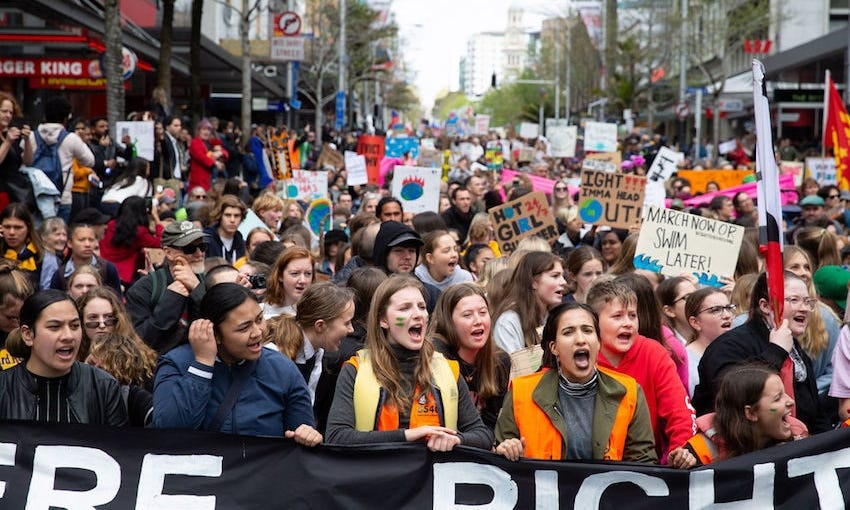Four key questions for the climate strikers
Climate change action took a backseat amid Covid, but the climate strike teenagers say that isn't good enough
Good morning and welcome to The Bulletin for Friday 9 April, by Alex Braae for The Spinoff. Presented in partnership with Z Energy.
In today’s edition: Four key questions for the climate strikers, unvaccinated border worker tests positive, and big implications of ban on arrivals from India.
Image: The climate strike in Auckland in 2019 (Photo: Sylvie Whinray)
We're going to start today's Bulletin with something different – a short interview. Because today teenagers across the country will once again leave school and go on strike, to demand more action is taken on climate change. There has been comparatively little media coverage compared to earlier strikes, but the issue is no less pressing. Yesterday I phoned up Izzy Cook, one of the organisers of the Wellington strike, to put a few questions to her about the movement and the wider issue.
In 2019 well over 100,000 people turned out for this event around the country. Are you worried that momentum has been lost in the interim?
"Yeah, definitely. We do know that momentum has been lost in the movement because of Covid-19."
Since that strike, various government announcements have been made, and the climate change commission has been established. How would you assess the state of progress on climate change at a policy and government action level?
"Currently at School Strike we definitely feel like there hasn't been enough action taken recently. It has been difficult for the government with Covid-19, but now that we're coming out of it, we believe now is the time to take action."
When you personally think about your later life in a world increasingly affected by climate change, do you feel optimistic or pessimistic?
"I would definitely say pessimistic. I think I speak for a lot of the youth of Aotearoa when I say that right now the current state of the world in terms of climate change isn't looking very optimistic."
Finally, a lot of The Bulletin is about finding things people should read and telling them about it. If there was a particular article that you think people should read, what would it be?
If I could tell people to read anything, it would be to read about what the world will look like in fifty odd years because of climate change if no action is taken. Will we have wild animals? Will we be able to breathe the air? How much of the world will be submerged in water? I think this article will help people see what's going to happen.
In related news, the government announced yesterday that coal fired boilers will be phased out by 2037, with new low and medium heat boilers banned by the end of the year. Stuff reports there will be some exceptions to this rule, and the plan is still being consulted on. Dairy giant Fonterra – a major coal user – are on board, but some other food producers are nervous about their energy supply. Money will be made available to industry to make the switch. In reaction, Greenpeace was cautiously optimistic at the news, though argued that the lag time was too long.
There were some really significant Covid-19 updates yesterday, with potentially quite serious implications. First of all, a border worker has tested positive, and as our live updates reports he twice missed vaccination appointments due to personal reasons. There are no locations of interest to report at this stage and the ministry believes the public health risk to the wider community is low. Radio NZ's news bulletins reported that the government isn't yet clear on how many border workers remain unvaccinated.
Meanwhile, arrivals from India have been temporarily barred from entering New Zealand, even if they're citizens. PM Ardern cited the high daily average of cases coming into MIQ from India, and said the suspension would last until April 28. For the first time, it will also apply to New Zealand citizens and residents. Current case numbers in India itself are ballooning, with a daily average of new cases in the high tens of thousands (and there are some suggestions that the case and death tolls aren't a complete accounting of the scale of the outbreak.) There are also concerns about the state of pre-departure testing in India. The NZ Herald reports Ardern isn't ruling out extending the ban to other countries with high risk outbreaks.
Is the government's decision legal? That's a hugely contentious question, and Otago law professor Andrew Geddis has waded into the complexity. The right of return is an integral part of citizenship, but under the Covid-19 Public Health Response Act the Covid minister (Chris Hipkins) has quite incredible sweeping powers, with wide latitude to use them. That doesn't necessarily mean the action is automatically legal though – more that if it can be demonstrated to be justified, then the government would be standing on firmer legal ground.
And on a wider point, there's got to be a worry that this decision will disproportionately affect the Indian community, through no fault of their own. Some in the community have expressed their anger to the Indian Weekender, suggesting that it was a "decision-based on unconscious bias than actually on science and logistics." There will be hundreds, if not thousands of people directly affected by this ban, and they have every right to feel it is unfair. Radio NZ's Katie Scotcher spoke to one Indian New Zealander who said he had been "left to fend for himself" amid cancelled flights and massive family disruption.
The Spinoff can’t exist without our members. If you want to help us stay curious and keep our team across New Zealand’s breaking stories, please donate today.
Year after year, bee colony death figures are continuing to rise, reports Maja Burry for RNZ Rural. While losses over winter are a normal part of beekeeping, the results of a survey is raising concerns about the increasing scale. There are a range of causes for the colony deaths, including the hated wasp, and research is underway to find out more about the leading causes.
A grubby little rort (which is allowed under parliamentary rules) has been revealed, with taxpayers footing the bill for MPs to rent properties from themselves. Stuff's Thomas Coughlan reports multiple non-Wellington MPs buy property in the capital, and then claim an accommodation allowance to help pay for it. As I say, there is no suggestion of legal wrongdoing, but the story is well within the public interest in showing one of the largely unknown financial perks of being an MP.
Campaigners are pushing harder on Ports of Auckland CEO Tony Gibson to step down over health and safety failings. Radio NZ reports a letter was delivered yesterday morning, by a group that included a leading unionist, Māori leaders and an Auckland councillor. Gibson was not there to receive the letter in person, and a port spokesperson said the organisation is focused on implementing the findings of a recent critical report.
A pithy bit of feedback regarding yesterday's feature, linking to an NBR article about Outbrain. Marty wrote in to express how uncomfortable he is seeing Outbrain content on legitimate news websites, particularly given the links are made to look like genuine articles. His metaphor: "I can’t think of any other product or service that includes a knock off version of that product or service in the core product. Imagine buying a bag of carrots and there was a plastic one in it."
Just quickly, it was a real honour to be invited to speak on a UN Youth panel about journalism and misinformation yesterday, as part of the Aotearoa Youth Declaration conference. I won't go into the content or anything here, but what I'll say is this: There are clearly plenty of rangatahi in this country who are sharp as, ask intelligent and insightful questions, and I really hope a few of them decide to have a crack at a career in journalism.
Got some feedback about The Bulletin, or anything in the news?
Drop us a line at thebulletin@thespinoff.co.nz
Right now on The Spinoff: Bernard Hickey writes about the new economist consensus emerging about how to reduce inequality, and asks why our government is lagging behind. Stewart Sowman-Lund reports on how NZ On Air plans to spend $55 million for 'at-risk journalism'. Economist Rosie Collins writes about how subtle policy changes could make working from home a real climate change asset. Sarah Hillary writes about the painstaking restoration of a painting stolen at gunpoint, and found under a bed a week later. Psychology professor Douglas Elliffe explains the 'law of effect', or why we push the green button on the train even though it doesn't do anything. Megan and Erika from TrueBliss walk down memory lane with Alex Casey, ahead of the return of Popstars. And Sam Brooks finds plenty to like in the new season of Guy Williams show New Zealand Today.
For a feature today, a thoughtful piece that addresses the legacy and contemporary image of Mohandas Gandhi, a figure revered by many people around the world. As writer Tamoghna Halder points out on Al-Jazeera, that is by no means a universal view, and for good reason. And it comes at a time when there have been some high profile vandalism attacks on statues of Gandhi in the US, amid a wider anti-racism movement. Here's an excerpt, from a piece that doesn't shy away from complexity.
Rightly or wrongly, Gandhi is a revered icon in the eyes of many Indian Americans. As they see Gandhi as part of their identity, they perceive the vandalisation of his statues not as an anti-racist statement, but an attack on their community.
Therefore, the toppling of Gandhi statues in the US, without an accompanying discussion on Gandhi’s complicated legacy, achieves nothing other than aggravating the Indian American community and, more importantly, provides ammunition to those trying to derail the anti-racist movement.
Nonetheless, while the wisdom of targeting Gandhi’s statues in the US as an anti-racist action must be questioned, the current Indian government’s attempts to use such incidents to its advantage and paint itself as the primary defender of Gandhi’s anti-colonial legacy should also be challenged.
In sport, two great cricket reads (and they might be the last cricket pieces I share for a while, so make the most.) Writing on The Spinoff, Michael Appleton has written about the upcoming challenges for the Black Caps that will define whether they can be considered the greatest New Zealand side of all time. And on After the Whistle, White Fern Suzie Bates has written a letter to her 13 year old self, about commitment, intensity, and keeping the love of the game at the forefront.
That's it for The Bulletin. If you want to support the work we do at The Spinoff, please check out our membership programme.







